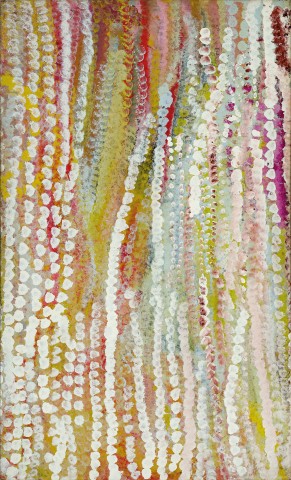AWELYE, 1994
EMILY KAME KNGWARREYE
synthetic polymer paint on linen
150.0 x 90.5 cm
bears inscription verso: artist’s name and Delmore Gallery cat. 94K39
Commissioned by Delmore Gallery, via Alice Springs, Northern Territory
Phillip Bacon Galleries, Brisbane (label attached verso)
Private collection, Brisbane, acquired from the above in 1996
Renowned for her colourful and vibrant paintings, Emily Kngwarreye chronicled on canvas the ever-changing desert country of her homeland Alhalkere. Located at the western edge of Utopia this triangular shaped country was where Emily was born and where she lived in the traditional ways of the eastern Anmatyerre, following a way of life that had continued unchanged from long before European presence. Her mark making recorded the seasonal variations, sometime subtle, often dramatic, of the harsh desert environment and the explosion of growth that occurred after rain. Referred to by Emily as the ‘green time’1, the desert would come to life, wildflowers carpeting the red earth and plants and grasses flourishing, supplying the women with seeds, tubers and fruit.
Through her use of pattern and colour, Kngwarreye had seemingly endless variations to call upon in the depiction of her country. Her paintings would often dissolve into fields of layered colour achieved through a build-up of dots upon dots as in Awelye 1994. Here, Kngwarreye bears witness though her painting, to that abundance that carpets the earth after rain and provides a basis for understanding the reverence and enthusiastic anticipation of the woman's ceremonial activities called "Awelye" that celebrate the hardiness and fertility of their bush tucker and food sources, and in turn, their own resilience.
1. Isaacs, J., ‘Amatyerre Woman’ in Isaacs, J., Smith, T., Ryan, J., Holt, D., and Holt, J., Emily Kame Kngwarreye Paintings, Craftsman House, Sydney, 1998, p. 13
